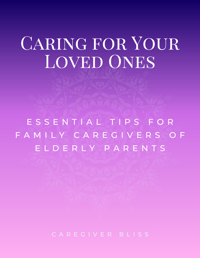15 Sandwich Generation Insights for Elderly Family Caregivers

In the complex web of caregiving responsibilities, the sandwich generation finds themselves wedged between the needs of their aging parents and the demands of their own families. Juggling the care of elderly loved ones while managing their own households and careers can be overwhelming.
In this article, we explore 15 insights for those navigating the delicate role of being an elderly family caregiver in the sandwich generation.
1. Understanding the Sandwich Generation
The term "sandwich generation" refers to individuals who find themselves caring for both their aging parents and their own children simultaneously. Recognizing the unique challenges this generation faces is crucial for effective caregiving.
2. Open Communication
Foster open and honest communication with both your elderly parents and your own family. Discuss expectations, preferences, and potential challenges to ensure everyone is on the same page.
3. Create a Support System
Building a reliable support system is essential. Connect with other members of the sandwich generation, join support groups, and lean on friends and family for emotional support and practical advice.
4. Stay Informed
Keep yourself informed about your elderly parent’s health conditions, medications, and medical history. This knowledge is vital in emergencies and helps in making informed decisions regarding their care.
5. Legal and Financial Planning
Work with your parents to establish legal and financial plans, including powers of attorney, wills, and healthcare directives. This can provide clarity and guidance during challenging times.
6. Explore Community Resources
Research and leverage local community resources such as senior centers, meal delivery services, and support groups. These resources can alleviate some of the caregiving burdens and provide a sense of community.
7. Self-Care is Non-Negotiable
Caring for others requires caring for oneself. Prioritize self-care to avoid burnout. Whether it's taking short breaks, seeking professional help, or engaging in hobbies, self-care is essential for long-term caregiving sustainability.
8. Technology as a Caregiving Aid
Embrace technology to make caregiving more manageable. Utilize health monitoring apps, online support forums, and communication tools to stay connected with healthcare providers and family members.
9. Balancing Work and Caregiving
Negotiate flexible work arrangements if possible, and communicate openly with employers about your caregiving responsibilities. Finding a balance between work commitments and caregiving is crucial for maintaining your well-being.
10. Empower Your Parents
Encourage your elderly parents to maintain as much independence as possible. Involve them in decision-making processes related to their care, respecting their autonomy and preferences.
11. Resilience in the Face of Challenges
Understand that challenges will arise, and flexibility is key. Cultivate resilience by adapting to changing circumstances and seeking solutions rather than dwelling on problems.
12. Cultivate Positive Relationships
Nurture positive relationships with healthcare professionals, family members, and friends. A strong support network can provide valuable insights, assistance, and emotional support.
13. Educate Yourself on Aging Issues
Stay informed about the aging process, common health conditions, and available caregiving resources. Education empowers you to make informed decisions and provide better care.
14. Celebrate Small Victories
Recognize and celebrate the small victories in caregiving. Acknowledge the positive moments and achievements, no matter how minor, to maintain a positive outlook.
15. Plan for the Future
Be proactive in planning for the future. Discuss long-term care options, explore assisted living facilities, and consider financial preparations for potential healthcare needs.
Conclusion
Being a part of the sandwich generation comes with its unique set of challenges, but with the right mindset, support system, and resources, caregivers can navigate these responsibilities with compassion and resilience. By staying informed, fostering open communication, and prioritizing self-care, members of the sandwich generation can provide the best possible care for their elderly parents while maintaining their own well-being.
We'd love to hear your thoughts and experiences as part of the sandwich generation. Have you faced similar challenges or discovered unique strategies for managing the delicate balance of caring for both your elderly parents and your own family?
Share your insights in the comments below, and let's create a supportive space where we can learn from each other's journeys and build a community of encouragement for those navigating the complexities of caregiving. Your voice matters, and your experiences may resonate with and inspire others in the same situation!
Free Guide:
Caring For Your Loved Ones
 Attention family caregivers! Are you struggling to provide the best care for your aging parents? Don't worry, we've got you covered.
Attention family caregivers! Are you struggling to provide the best care for your aging parents? Don't worry, we've got you covered.
Download our free guide, Caring for Your Loved Ones: 10 Essential Tips for Family Caregivers of Elderly Parents, and unlock the secrets to becoming an exceptional caregiver.
From adapting the home environment to promoting independence, this invaluable resource will transform your caregiving experience into a more rewarding journey. Don't wait—give your loved ones the care they deserve, and download your free copy today!
